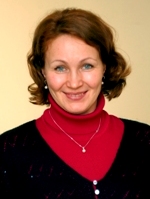 |
VIII
CONGRESO INTERNACIONAL y XIII
GRANADA
(ESPAÑA), 19-22 de
NOVIEMBRE, 2015
|
 |
Elena R. Isáeva Chief of the Department of General and Clinical Psychology, First Pavlov Saint Petersburg State Medical University RUSSIA |
|
Degree in psychology by the Saint
Petersburg State University.
Many years of research experience in such institutions as Saint Petersburg State University and The Saint Petersburg Bekhterev Psychoneurological Research Institute, and in teaching practice in Clinical Psychology and close fields. Her research focuses on the following areas: psychosomatic medicine, clinical psychology, neuropsychology, counseling. She is currently working on topics such as the psychological resources for adaptation, psychological adaptation in terms of physical illness, adherence to healthy dental behavior, etc. Certified Specialist in pedagogy of higher education, psychotherapy, psycho-medical diagnostics, sexology and more. She has more than 95 publications (monographs, manuals, articles in journals). She is member of the editorial board of several national journals. At present professor and Chief of the Department of General and Clinical Psychology at the First Pavlov Saint Petersburg State Medical University. INVITED SYMPOSIUM ABSTRACT Psychologist in cardiology clinic: recent studies. Why is this important? One of the problems in clinical psychology is the study of psychosomatic relationships: the role of psychological factors can’t be doubted, but there are still unresolved issues. The epidemical spread and the high risk of mortality became reasons for close attention to coronary heart disease. The topical issues of psychocardiology will be discussed in this symposium. We will present some studies: the cognitive functioning after surgical intervention, the psychological factors that influence the adherence to treatment, the patients’ emotional state during the expectation of surgery, and others. The abovementioned aspects play an essential role in the rehabilitation. The discussion may help understanding the relationship of biomedical and psychosocial factors in the development of cardiac pathology and the adaptation to the disease. This analysis allows to answer fundamental questions of clinical psychology, as well as practical needs of the clinic: psychological assistance of patients and the formation of satisfactory quality of life in illness. |
|